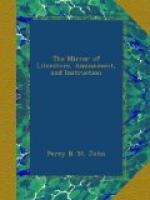Arrived within the abbey garth, he was received with due respect by the brethren of Irelagh, and arrangements for the embarkation of the wine were completed to his entire satisfaction.—“Welcome, Father Cuddy!” said the prior, “grace be on you.”
“Grace before meat then,” said Cuddy, “for a long walk always makes me hungry, and I am certain I have not walked less than half-a-mile this morning, to say nothing of crossing the water.”
A pasty of choice flavour felt the truth of this assertion as regarded Father Cuddy’s appetite. After such consoling repast, it would have been a reflection on monastic hospitality to have departed without partaking of the grace-cup; moreover, Father Cuddy had a particular respect for the antiquity of that custom. He liked the taste of the grace-cup well; he tried another,—it was no less excellent; and when he had swallowed the third he found his heart expand, and put forth its fibres, as willing to embrace all mankind! Surely then there is Christian love and charity in wine!
I said he sung a good song. Now though psalms are good songs, and in accordance with his vocation, I did not mean to imply that he was a mere psalm-singer. It was well known to the brethren, that wherever Father Cuddy was, mirth and melody were with him. Mirth in his eye, and melody on his tongue; and these, from experience, are equally well known to be thirsty commodities; but he took good care never to let them run dry. To please the brotherhood, whose excellent wine pleased him, he sung, and as “in vino veritas,” his song will well become this veritable history.
“O, ’tis eggs are a treat
When so while and so sweet
From under the manger they’re taken;
And by fair Margery,
Och! ’tis she’s
full of glee,
They are fried with fat rashers of bacon.
“Just like daisies all spread
O’er a broad sunny mead
In the sun-beams so beauteously shining,
Are fried eggs, well displayed
On a dish, when we’ve
laid
The cloth, and are thinking of dining.”
Such was his song. Father Cuddy smacked his lips at the recollection of Margery’s delicious fried eggs, which always imparted a peculiar relish to his liquor. The very idea provoked Cuddy to raise the cup to his mouth, and, with one hearty pull thereat, he finished its contents.
This is, and ever was, a censorious world, often construing what is only a fair allowance into excess; but I scorn to reckon up any man’s drink like an unrelenting host; therefore, I cannot tell how many brimming draughts of wine, bedecked with the venerable Bead, Father Cuddy emptied into his “soul-case,” so he figuratively termed the body.




